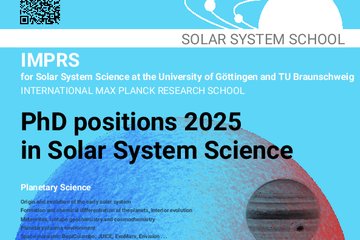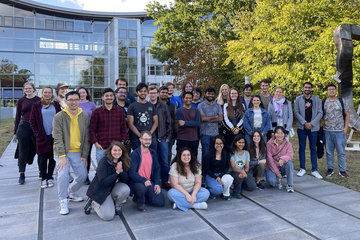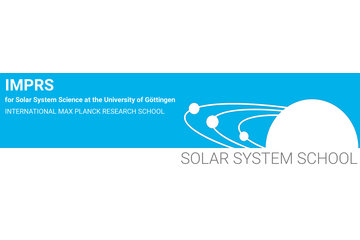
FAQ
Frequently Asked Questions about the application and recruitment procedure for PhD positions in geosciences and astrophysics at the Solar System School.
FAQ Application
In July 2024, the IMPRS will issue the next call for applications. Applications in response to the 2043 call will be accepted exclusively through the online application portal. Applicants can register for the new call at the online portal starting on May 1 but are advised to preferably submit their application in the time period from 1 August 2024 to 1 October 2024. The list of open PhD projects is usually updated during August/September each year.
The applicant will need to fill an online application form and upload documents such a CV, academic degree certificates and transcripts with translations into English or German, and supporting documents such as English language tests or GRE tests.
Upon submission of the application material, the two referees that the applicant has named in their application will be contacted and asked for letters of recommendation on behalf of the applicant. It is the applicant's responsibility to ensure that the information in the online application form is concise and complete, that all documents have been uploaded and submitted according to the instructions in time before the deadline, and to ensure that the referees they name have been informed and have agreed to answer a request for a letter of recommendation no later than by 10 October 2024.
The applications will be reviewed starting 10 October 2024. Invitations for interview will be sent out in late 2024 or early 2025, but not all decisions are made on the same schedule. There will be pre-screening online interviews with selected candidates in late 2024, and on-site interviews for invited candidates will take place during one week in the first quarter of 2025. Most applicants will have received a notification about the status of their application by May 2025. Candidates will be able to check on the status of their application by logging in to the online portal.
Candidates will be pre-selected based on their academic qualifications and recommendations. An admission committee that includes faculty members of the participating institutes reviews the applications, selects them based on the students' excellence as proven by their university records and by letters of recommendation, and advises the potential supervisors about the candidates and their qualifications.
Candidates under consideration will be notified at the end of the year, or earlier if they are selected for an online pre-screening interview, or later if they are initially placed on the waiting list. Invited candidates will be given more details on how to prepare for the scientific discussions during interview week. An important part of the selection procedure is a personal interview during interview week with the committee and faculty members. This will give invited candidates the opportunity to meet the training faculty and to visit the participating scientific institutions. The interview may be held at the MPS in Göttingen or at one of the partner institutes. In some cases, it may instead also be conducted via video conference. Applicants who are invited for an interview will receive financial assistance for travel and accommodation expenses.
The final decision about the acceptance of a student rests with her/his potential supervisors. Admission to the program may be dependent on the fulfillment of certain requirements that need to be met before the begin of the new academic year (e.g. completion of a degree, completion of credit courses, participation in an English language course).
While it is not mandatory to contact the members of our faculty before sending your application, your chances of getting accepted into the program may increase if you have gotten a particular potential advisor interested in working with you. Please do not send generic requests to all of them, but only contact those whose fields you would like to discuss in more detail with specific questions. You can then refer to these previous discussions in the appropriate spot in your application.
About 35 students are enrolled at any given time. Their funding comes from several sources. The yearly call for applications primarily addresses candidates applying for an IMPRS-funded position, but anyone hired on a project position and desiring to pursue work towards a PhD under the roof of the IMPRS also needs to submit an application to IMPRS. In some cases, applicants for IMPRS positions will also be redirected to open project positions suitable to pursue PhD work. We admit about 10 PhD students in total per year.
Short answer: No (most IMPRS are PhD programmes only, see also here).
Long answer: Maybe. While it is true that the IMPRS currently can only accept candidates with a Masters's degree or equivalent for enrolment and funding in the Solar System School PhD program, there are at least two options to collaborate with MPS scientists on your Master thesis topic. As a Master student doing research at the MPS, you could still benefit from the local IMPRS infrastructure (international office, lectures, retreats, social events), the main difference is that Master students are not eligible to be funded by the IMPRS.
The University of Göttingen does offer a local M.Sc. Physics program which is open to international students. General information for international students may be found starting from here, while information on how to enrol specifically into the M.Sc. Physics program may be obtained from here. While you have to take care of your housing and living expenses yourself, you might still be able to support yourself through student research assistentships or teaching assistentships. Ask the MPS supervisor you would be interested to study with about possible options, or look for job offers for a "Studentische Hilfskraft" posted by the university here.
In this case, delivering an impressive Master's thesis made at the MPS and as a consequence having a local supervisor support you will result in a high priority for your application to proceed into the IMPRS PhD program.
FAQ Letters of Recommendation
Upon submission of the application, the referees that the applicant has named in their application will be automatically contacted and asked for letters of recommendation on behalf of the applicant. The applicant needs to contact all referees well ahead of the deadline! Applicants may only provide a referee's email address if that referee has been informed and has agreed to answer the upcoming automatic request that will be triggered by the application submission. It is the applicant's responsibility to ensure that the referee email address is valid, and to ensure that the referees they are naming have agreed to answer a request for a letter of recommendation no later than by October 10. Candidates may submit their application as late as October 1, leaving their referees with ten days to reply to the automatic request, or may choose to submit their application at any earlier date (after August 1) to give their referees correspondingly more time to upload their letter before the October 10 deadline.
We ask referees to provide their assessments exclusively via our online form. Detailed instructions are provided in the request email. The online form consists of two parts: an upload area to provide a letter of recommendation in pdf format, and a web form area with three sets of questions. The first question in the web form is "What is your relationship to the candidate?" (including a free-text field for a short answer), the second question is "For how long have you known the candidate?" (including a free-text field for a short answer). In the third set of questions the referee may evaluate the candidate with respect to eleven qualities using a percentile scheme by checking boxes. A referee may choose to fill the web form and upload a recommendation letter for the candidate in pdf format (giving the recruitment and admissions committee a very complete picture of the applicant), or may choose to provide information for one of the two parts only (recommendation letter only or web form assessment only), or may fill neither of the two parts before submission (resulting in the weakest possible recommendation). No part of the recommendation will be shared with the applicant.
Applicants are asked to provide institutional email addresses when filling in the contact details of their referees. Letters of recommendation received through requests to email addresses associated with commercial email providers will be given lower weight or may be disregarded. We reserve the right to automatically reject non-institutional email addresses for referees. Applicants are responsible to provide typo-free, valid email addresses for themselves and for their referees. Requests for letters of recommendation will fail if the email address given is not working (even temporarily), which will leave the application incomplete and subject to immediate rejection without further notice.
The letters of recommendation that benefit a candidate's application most are usually those written by academic teachers or scientific supervisors of the applicant capable of judging the candidate's academic achievements and potential to perform excellent research. Letters should be provided on official institutional letterhead, otherwise they will be given lower weight or may be disregarded. That said, while the two mandatory letters would ideally come out of an academic/scientific research institution, applicants may choose to name an additional third referee who could in principle provide a recommendation letter with a focus on a different set of skills of the applicant.
The members of the recruitment and admissions committee appreciate the independent perspective of external referees. Applicants should choose two external referees. In addition, applicants have the option to name a third referee who can be affilated with the IMPRS or MPS. If an applicant asks an IMPRS or MPS scientist to act as a referee for them, and they agree to do so, then the person with the IMPRS or MPS affiliation volunteering to be a referee should remind the applicant that their name should be put as a third (additional) referee.
FAQ Admission Tests
ETS has assigned the Max Planck Institute for Solar System Research an institutional code to receive your TOEFL or GRE scores from them directly.
The TOEFL code for institution "Max Planck Inst Fellowship" (Solar System Research) is 5480.
The GRE code for institution "Max Planck Inst Fellowship" (Solar System Research) is 0070.
Please still submit your application by October 1. Take care to note on your application the date at which you have taken the test(s), as well as the date at which you expect the result(s) to become available. Then please send us your TOEFL and/or GRE physics test results scores by e-mail to info@solar-system-school.de as soon as they are available.
This is up to you, but test results indeed may not be very representative of your current skills if they are older than five years. If you are submitting old test results, please take care to put them into context in your application and explain how you think you have been able to maintain, or improve upon, the level documented by these results.
This is entirely up to you, as reflected in ETS's "ScoreSelect Option" policy. When considering the investment in time and money required to re-take a test, you might want to factor in the information by ETS that test-takers often achieve similar results when a test is repeated a short time interval after the previous one.
Candidates whose most recent academic education has not been entirely in English or German for at least two years are required to provide a certificate documenting proficiency in English, for example Cambridge Certificate in Advanced English, Cambridge Certificate of Proficiency in English, IELTS Academic, TOEFL-iBT, TOEFL-PBT, GER, CEF, UNIcert language tests or equivalent. Proficiency in English can also be demonstrated through a degree obtained in a course of study taught in English. Applicants who have worked or studied in an English-speaking country for at least two years within the last three years are exempt from having to provide a certificate. If no language test is available at the time of enrolment and none of the above exceptions apply, admission is not possible.
Applicants with university degrees obtained outside Europe who provide GRE physics or chemistry test scores will be given preference over those who do not provide test scores. This does not apply to geosciences projects, as there are no GRE geosciences test. We do not require GRE General test results, but you will have the possibility to indicate and upload your test results if you have them during the application process.
Admission tests links
TOEFL
The TOEFL code for "Max Planck Inst Fellowship" (Solar System Research) is 5480.
IELTS
GRE subject tests
The GRE code for "Max Planck Inst Fellowship" (Solar System Research) is 0070.











